According to Greek mythology, one day, a Phoenician princess was playing with her friends on the beach of Sidon. Zeus noticed her elegance and immediately fell in love. He descended from Olympus in the guise of a beautiful, gentle, white bull, persuaded the girl to climb on his back, and tricked her by swimming to Crete. Alas, the fickle supreme god abandoned her not long after, but Europa - the Princess's name - kept living on the Greek island and finally married the local king.
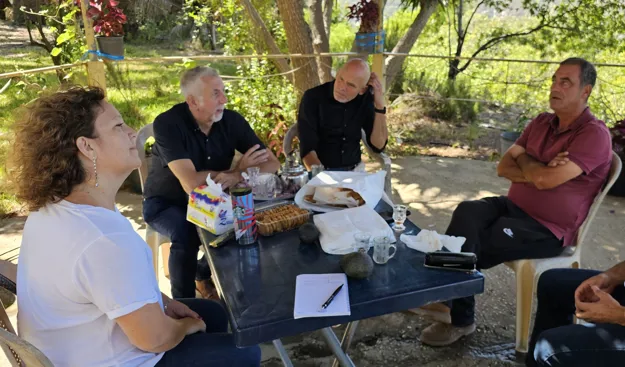
The continent of Europe, thus, owes its name to this girl from Phoenicia, now Lebanon. Since it is part of the Middle East, Lebanon has traditionally looked to the Arab world for trade, including fruits and vegetables. Though, for some years now, several companies seem to have crossed over to the old continent, like the Princess. The ancient ties between Lebanon and Europe appear to be rekindling.
With the CBI to Fruit Attraction
That is where the Netherlands Center for the Promotion of Imports from Developing Countries (CBI) comes in. "Eventually, the Lebanese fruit and vegetable sector could be of value to Europe in certain months, when local supplies are somewhat stagnant, at least with grapes and avocado," begins Piet Schotel, a sector specialist hired by the CBI. In September, he and Pieter Boekhout (FreshPlaza, AFL) visited 13 Lebanese fruit and vegetable companies for a week.
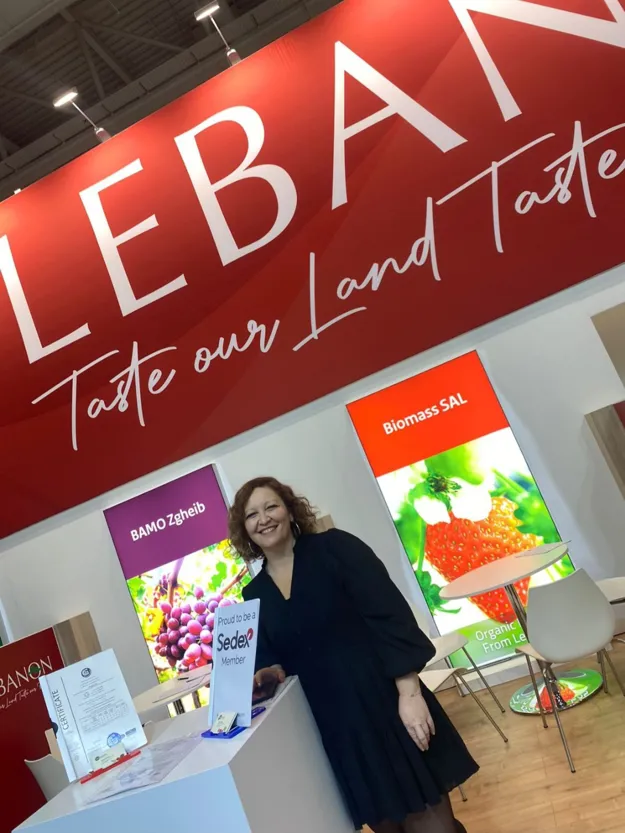 Hania at the Lebanese stand
Hania at the Lebanese stand
Founded in 1971, the CBI is an autonomous agency of the Dutch Foreign Affairs Ministry. It aims to strengthen small and medium-sized enterprises in developing countries' social, economic, and environmental sustainability by connecting those companies to European and regional markets. The CBI does not provide grants; it builds capacity through training and coaching, including creating marketing plans. This week, the center is assisting a group of Lebanese fruit and vegetable companies with a joint booth at Fruit Attraction in Madrid (Hall 1, booth 1C10).
Local export opens doors for CBI
The CBI project has been running in Lebanon since 2019. To draw up the export audits and contact various Lebanese fruit and vegetable companies, the center took on Hania Chahal. This independent Lebanese consultant specializes in horticulture and food sector marketing and economics and has over 20 years of experience in multiple projects in Lebanon, Iraq, Yemen, and Egypt. That includes under the auspices of USAID and through working experiences at FAO headquarters in Rome and studies in the United Kingdom. "In this project, I'm a business export coach for the fruit and vegetable companies; I maintain contact with the Chambers of Commerce, Industry, and Agriculture and work closely with Piet to organize, for example, participation in the Fruit Attraction," says Hania
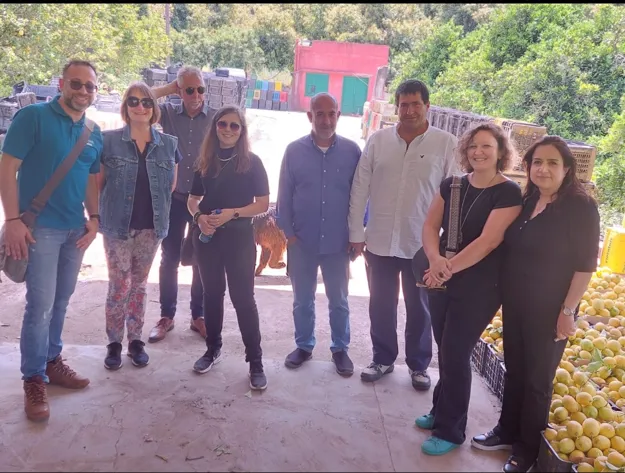
Hania, 2nd right on a company visit
Chances and challenges
"Lebanon, undoubtedly, has opportunities as a fruit and vegetable product exporter to Europe, facilitated by both supply and demand factors," adds Piet. "For instance, there are some interesting sales windows for Lebanese grapes and avocado, and that acreage has been increasing incredibly rapidly in recent years. Also, compared to other origin countries such as Brazil and Peru, Lebanon has the advantage of proximity. In times of growing environmental awareness, the sustainability aspect cannot be underestimated. On the supply side, the products' quality and flavor are a particularly large advantage for the Lebanese export sector. The country is blessed with an enormously favorable climate for fruit growing, very fertile soil, and hardly any water issues."
Yet, according to Piet, several obstacles must undoubtedly be overcome for Lebanese fruit and vegetable export sector-wide success with a stable, substantial supply. He cites the as-yet limited area under cultivation and political disinterest, manifested mainly in challenging logistics and a patent problem.
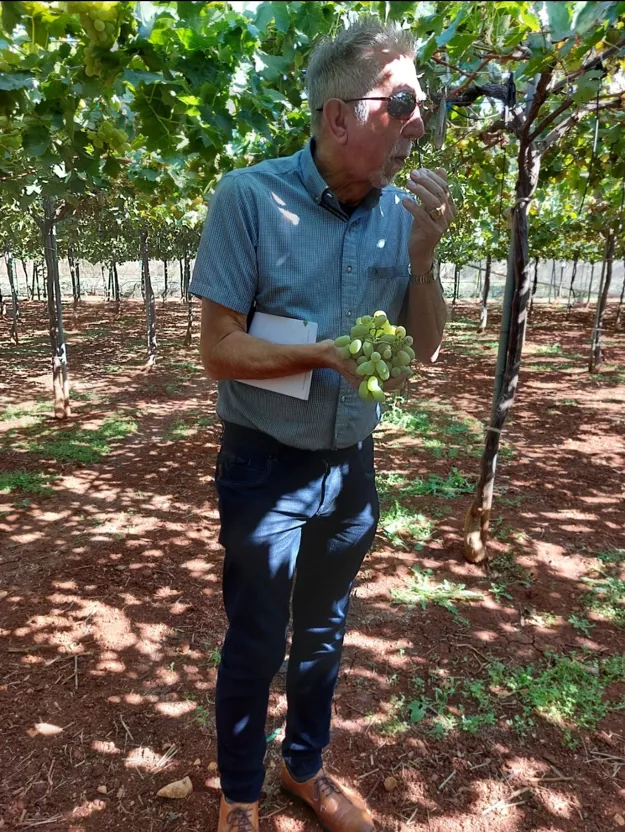 Piet tastes the almost ripe, grapes
Piet tastes the almost ripe, grapes
Hardly any seedless grape varieties
"Grape cultivation has the problem that growers may not cultivate varieties with intellectual property rights. Breeders cannot assert their rights in Lebanon, an issue that must be solved primarily at the government level. Hopefully, growers will soon come to agreements with major breeders because the European market demands almost exclusively modern, seedless varieties. And these are usually patent-protected, except for, say, Crimson," says Piet.
Logistics are challenging, too. "There's direct maritime transport to Northern Europe, but it's not weekly. The port of Koper in Slovenia is an option. It's close by and easily accessible, though I consider it mostly a gateway to Eastern Europe, especially for grapes. But Lebanese are traders and entrepreneurs. They've always been. If they put that mercantile spirit to full use with fruit and vegetable products, much is possible. Then, the logistics partners will certainly follow, provided the Beirut port authorities cooperate. It will benefit them, too."
Limited acreage
Nonetheless, there is no denying Lebanon's small size, part of which is mountain ranges. While these ensure plenty of water for horticulture, the usable acreage is not very big. And the available land is divided into countless small plots owned by many small-scale growers. "In that sense, Egypt, for example, is a step ahead," Piet reckons. "That country can send huge quantities of fruits and vegetables to Europe. Lebanon will have to focus on niche products."
"I believe the country will make inroads in European exports in the coming years. We must remain positive, although much will depend on political stability. And there will definitely be several small bumps to overcome, like the closure of an important packing facility in the Bekaa Valley this summer. They must find alternatives, which there are, but those will take some effort. The export ban to Saudi Arabia in 2021 kicked everything into gear. The train is on track, and the sector is on board. Next stop: Fruit Attraction," Piet states with determination.
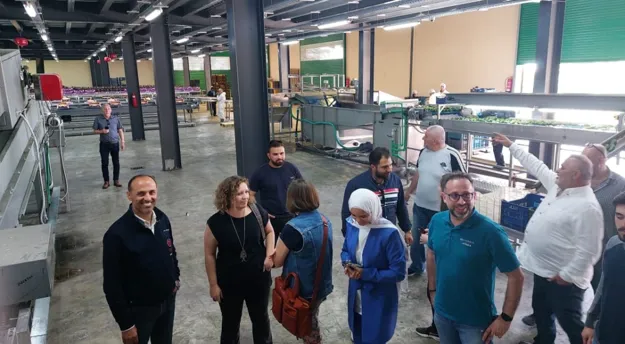 Company visit fruit exporters to share knowledge
Company visit fruit exporters to share knowledge
Private sector self-reliance
Hania likes emphasizing the country's private sector's self-reliance. “I worked at the UN’s Food and Agriculture Organization in Rome in 2002 and, in the following years, on a project on Syria and Lebanon's fruit and vegetable sector's export performance. My boss insisted on the importance of private sector self-reliance. The government should only facilitate exports through trade agreements, he claimed. I agree. With that in mind, I function as an independent consultant. I have great faith in our products - fruits and vegetables from Lebanon - because their quality is undeniable. My job is to help growers and exporters realize the Lebanese fruit and vegetable sector's full potential," she explains.
With the broad network Hania has built over the year - she knows numerous growers, visits processing plants and exporters, and is in contact with government agencies and departments at different levels and in all regions - as well as her marketing and export markets know-how, Hania has a good overview of the opportunities as well as the limits for the Lebanese fruit and vegetable sector.
"Many growers approach me for advice regarding the marketing potential of certain fruits or varieties, and I see more and more export-oriented companies. We're gradually moving in the right direction. In two years, the export figures may not be so different, but by 2030, the picture will surely look completely different. Where we used to stand still for a long time with the same products, packaging, and markets, I now see new varieties, brands, and destinations appearing. Europe's one of those. That's why, supported by the CBI, we're confidently and enthusiastically going to Madrid with a nice delegation. Not on the back of a white bull this time, by plane. But the adventure is no less great," Hania concludes.
For more information:
Piet Schotel
Center for the Promotion of Imports from Developing Countries (CBI)
2 Prinses Beatrixlaan
2595 AL, The Hague, NL
Tel: +31 (0) 886 024 300
Website: www.cbi.eu
Hania Chahal
Marketing Economist
Verdun, Jundi & Balaa Building, 3rd floor
Beirut, Lebanon
Tel: +961 30 428 72
Email: [email protected]
